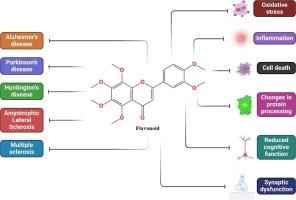Cellular stress response and neuroprotection of flavonoids in neurodegenerative diseases: Clinical insights into targeted therapy and molecular signaling pathways
IF 2.7
4区 医学
Q3 NEUROSCIENCES
引用次数: 0
Abstract
Neurodegenerative diseases (NDs) are caused by the gradual decline of neuronal structure and function, which presents significant challenges in treatment. Cellular stress responses significantly impact the pathophysiology of these disorders, often exacerbating neuronal damage. Plant-derived flavonoids have demonstrated potential as neuroprotective agents due to their potent anti-inflammatory, anti-apoptotic, and antioxidant properties. This review provides an in-depth analysis of the molecular processes and clinical insights that cause the neuroprotective properties of flavonoids in NDs. By controlling essential signaling pathways such as Nrf2/ARE, MAPK, and PI3K/Akt, flavonoids can lower cellular stress and improve neuronal survival. The study discusses the challenges of implementing these discoveries in clinical practice and emphasizes the therapeutic potential of specific flavonoids and their derivatives. Flavonoids are identified as potential therapeutic agents for NDs, potentially slowing progression by regulating cellular stress and improving neuroprotection despite their potential medicinal uses and clinical challenges. The study designed a strategy to identify literature published in prestigious journals, utilizing search results from PubMed, Scopus, and WOS. We selected and investigated original studies, review articles, and research reports published until 2024. It suggests future research and therapeutic approaches to effectively utilize the neuroprotective properties of flavonoids.

黄酮类化合物在神经退行性疾病中的细胞应激反应和神经保护作用:对靶向治疗和分子信号通路的临床见解。
神经退行性疾病(NDs)是由神经元结构和功能的逐渐衰退引起的,这给治疗带来了巨大挑战。细胞应激反应对这些疾病的病理生理学有重大影响,通常会加剧神经元损伤。植物黄酮类化合物因其强大的抗炎、抗凋亡和抗氧化特性,已被证明具有作为神经保护剂的潜力。本综述深入分析了黄酮类化合物在 NDs 中具有神经保护特性的分子过程和临床见解。通过控制Nrf2/ARE、MAPK和PI3K/Akt等重要信号通路,类黄酮可降低细胞压力并改善神经元存活率。研究讨论了在临床实践中实施这些发现所面临的挑战,并强调了特定类黄酮及其衍生物的治疗潜力。尽管黄酮类化合物具有潜在的药用价值,但它们被认为是NDs的潜在治疗药物,可通过调节细胞应激和改善神经保护来延缓NDs的发展。本研究设计了一种策略,利用 PubMed、Scopus 和 WOS 的搜索结果来确定发表在著名期刊上的文献。我们选择并调查了 2024 年之前发表的原创研究、综述文章和研究报告。该研究提出了有效利用类黄酮神经保护特性的未来研究和治疗方法。
本文章由计算机程序翻译,如有差异,请以英文原文为准。
求助全文
约1分钟内获得全文
求助全文
来源期刊

Brain Research
医学-神经科学
CiteScore
5.90
自引率
3.40%
发文量
268
审稿时长
47 days
期刊介绍:
An international multidisciplinary journal devoted to fundamental research in the brain sciences.
Brain Research publishes papers reporting interdisciplinary investigations of nervous system structure and function that are of general interest to the international community of neuroscientists. As is evident from the journals name, its scope is broad, ranging from cellular and molecular studies through systems neuroscience, cognition and disease. Invited reviews are also published; suggestions for and inquiries about potential reviews are welcomed.
With the appearance of the final issue of the 2011 subscription, Vol. 67/1-2 (24 June 2011), Brain Research Reviews has ceased publication as a distinct journal separate from Brain Research. Review articles accepted for Brain Research are now published in that journal.
 求助内容:
求助内容: 应助结果提醒方式:
应助结果提醒方式:


